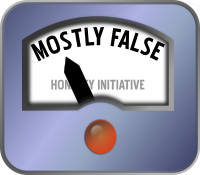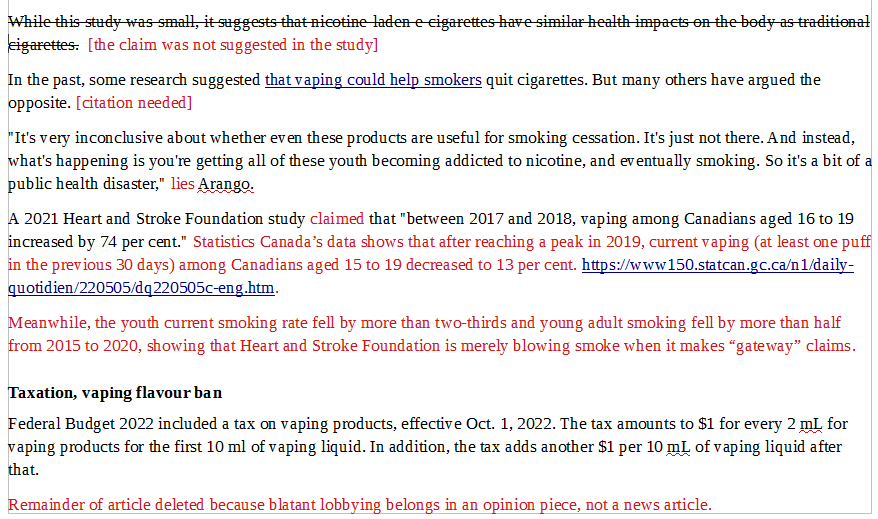| category | factcheck |
| score | Mostly False 🟥🟥🟥🟥🟧 |
| claim | "Poll finds vaping a gateway to smoking" |
| url | https://www.rmotoday.com/beyond-local/vaping-is-a-gateway-to-smoking-cigarettes-for-young-canadians-poll-finds-5643923 |
| author | RMOToday.com / Carol Eugene Park |
| tags | ['popcorn-news', 'gateway-hypothesis', 'repost'] |

Tobacco flavours, for no reason whatsoever, would alleviate the very serious gateway frights
HeartAndStroke.ca contracted an article with the usual spin on e-cigarettes - meant to validate prohibition efforts under the pretense of saving all the children. It relies entirely on the good old gateway drug hypothesis, despite available population-level evidence, and peaking out in 2019.
It portrays synthetic tobacco flavours as savior from the fictional mass teen addiction. It kinda ignores that there's little historic evidence of real cigarettes` taste to have any such property. And despite the claimed worry about gateways, is entirely oblivious to habituation risks of ATFs with their vague resemblance but no factual irritants. Even if the ensuing black market will soften such outcomes, or only affect frequent teen use (you know, the very ones that would be worth worrying about). Apart from ignoring a more realistic outcome - of driving adults back to smoking, with actual health consequences; and teen disposition to smoking being foremost determined by parental prevalence.
HeartAndStroke does collaborate in stopbigtobacco.ca, so they ought to be aware of the general smoking fallouts. Just didn't transpire into this article. Which was 40.9% quotes, and 0% factchecked.
references

phrase check
| claim | qs | desc |
|---|---|---|
Two-thirds […] have used e-cigarettes […] before smoking cigarettes |
🟥 | Which kinda contradicts the whole article premise, since clearly two thirds of teens aren't smoking now. But as Phil pointed out: the intro referred to the massive 3% who tried both. |
For comparison, one-third […] reported picking up an e-cigarette before a smoke. |
🟥 | Adults, as in 18-24 yo. |
the big concern that we always had at Heart and Stroke |
🟧 | This concern is seemingly not extended into looking at population-level outcomes or recognizing common liability factors, which have an actual impact. |
And in fact, that's what we see, |
🟥 | […] if we explicitly do not look at the use correlation. (Vaping has nearly eradicated teen smoking in the US.) |
Now, you're getting dual use, |
🟨 | Smoking and vaping are economic/bidrectional substitutes. |
very harmful vaping |
🟪 | It's actually a low-risk activity with minimal health consequences, and measurably lower dependency potential. Unlike smoking. |
vaping may be less harmful. |
🟥 | No reputable scientist says "may" there. |
But Arango emphasizes that "vaping is harmful, period. |
🟥 | Arango might not understand that vaping substitutes smoking. Period. Or he's not allowed to acknowledge it for purposes of scare-based prevention efforts (or undisclosed motivators). |
A 2021 study […] could result in heart attack, stroke, raise blood clotting risks,, |
🟫 | Doesn't really follow from the slim findings. Hence the wishy-washy phrasing. See below. |
have similar health impacts on the body as traditional cigarettes. |
🟥 | Vaping remains 95% less harmful. PR papers and repetition don't accumulate into excessive harms. |
whether even these products are useful for smoking cessation. It's just not there. |
🟨 | Yes, but no. There are ample RCT and meta studies. And hysterical dissent out of California despite real-world evidence. While discourse is ongoing, disputing any and all efficacy is blatantly false. (Also irrelevant, as the inherent harm reduction makes the whole NRT comparison moot anyhow.) |
all of these youth becoming addicted to nicotine |
🟥 | Unlike youths, who are mostly using it experimentally and without signs of strong dependence (that's the word); some organizations with vested interests seemingly develop severe addictions to post-truth-era behaviour however. |
Vape taxes is one preventive regulation […] can reduce young people's consumption of vaping products. |
🟨 | Oh not just that. Making combustibles more affordable has a few more benefits. For taxes that is, not for health. It primarily targets adults, and is guaranteed to drive up smoking (even HealthCan was upfront about it) and thus cancer again. Pretty evident in Nova Scotia already. |
reducing vaping amongst youth, especially because these are price-sensitive, |
🟩 | It sure does. Obviously ignores the consequences of evasive behaviour in teenagers. |
Nine in 10 young people said the flavours played a significant role |
🟧 | Classic flavour-fallacy with undisclosed sourcing. |
a ban on vaping flavours |
🟥 | Not really a ban, since it doesn't make products flavour-free. It mandates tobacco relapse/habituation flavours. The magical teen repellent attributes aren't substantiated, other than from inverted use-distribution guesses. Since synthetic tobacco flavours don't resemble cigarettes very much, they're not super likely to curtail anything but infrequent/test use. They will desensitize frequent users. So the concern for gateway effects remains somewhat incongruent here. |
Disclosing the ingredients is helpful for researchers […] it's questionable whether people |
🟩 | Yes, but no. Few will read them. But obviously consumer-driven regulation is preferable to regulators who are kowtowing to hysteria instead of weighting risks/benefits proportionally or among the whole population. |
warnings that are prominent […] that speak very directly to the harms of vaping |
🟧 | Absolutely made sense - if the warnings were informed by realistic risks. Exaggerations would not just fail to convince anyone, but undermine credibility of cigarette warnings. |
the "study"
The article also references a study. It should firstly be noted that the ERS is not an overly trusty source on the topic. They're still lying their bum off about popcorn lung and EVALI, albeit slightly more covert than US counterparts.
With a participant size of n=22 it's as insignificant as the findings. Nicotine does indeed stiffen blood vessels. Temporarily. Which is exactly how the test parameters were construed to affirm this non-news discovery. Spinning "endothelial independent microcirculation" into strokes and clotting risks does very much rely on subjunctive phrasing ("could"). But it's very much par for the article, itself grasping for straws. Usually such studies are used to internally rationalize protecting smoking, not for press notes. Seemingly the US has rubbed off recently.
verdict
It's pretty telling that comments are enabled on Squamish Chief articles
that don't look "inspired" by PR campaigns. The authors conduct with
twitter comments is also enlightening about any ethical considerations.
But overall it's not that interesting of a write up, thus "mostly false".